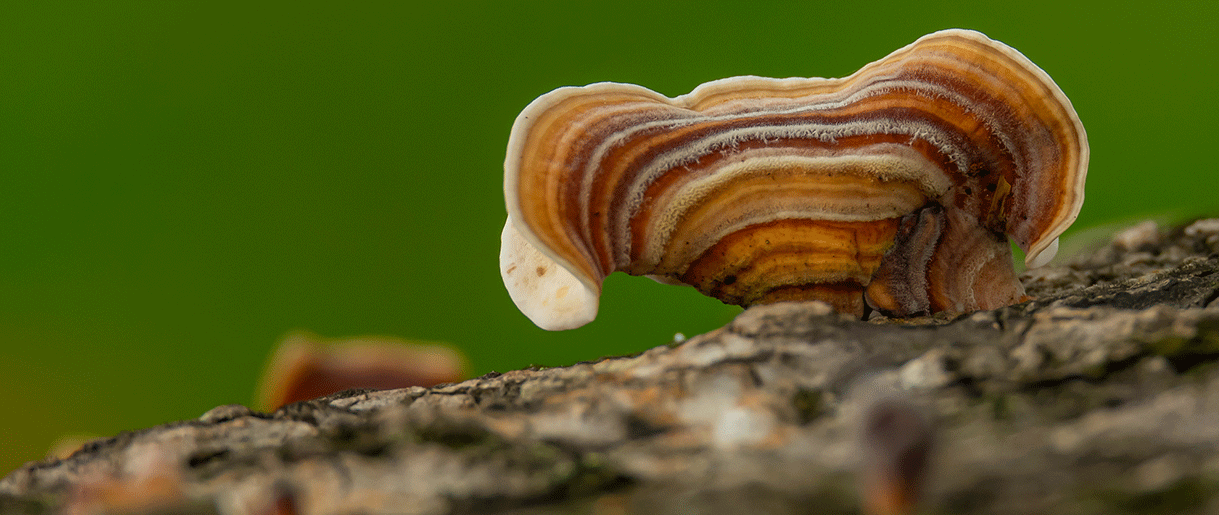Boasting the ability to boost your immune system, protect you from inflammation, keep you young, and even combat cancer cells, Turkey Tail is one of the few mushrooms that carry tens of benefits.
This unusual fungi, however, is relatively new, and very few people understand how it delivers all its benefits. Also, most people do not know how to use Turkey Tail mushrooms.
In this detailed guide, we will examine each benefit offered by Turkey Tail. We will also show you the research and the ideal Turkey Tail mushroom dosage.
What Are Turkey Tail Mushrooms?
Turkey tail mushroom, known by its scientific names such as Coriolus Versicolor or Trametes Versicolor, is a medicinal fungus that grows on stumps, tree trunks, and decomposing wood of a deciduous tree.
It is a multicolored mushroom with a flat, fluted disc-like shape that can grow up to four inches wide. The texture is tough and leathery.
Turkey tail mushrooms get their name from the striking colorful rings in the cap. The shades of orange, brown, yellow, grey, and cream resemble a turkey's feather.
The turkey tail mushroom grows all over the world. However, it is common in the temperate woods(1) of the United States, Canada, and Europe, including the United Kingdom and Australia.
Coriolus Versicolor has been used in traditional Asian medicine and North American herbalism for hundreds of years. Turkey tail mushrooms have an array of health-supporting benefits.
The turkey tail mushroom benefits have earned the fungi a position as a symbol of longevity, good health, and spiritual attunement. Even in the modern world of functional mushrooms, turkey tail is held in high regard.
Below are some of the reasons most people are using Turkey Tail mushrooms.
11 Amazing Health Benefits Of Turkey Tail Mushroom

The turkey tail mushroom can help with the following:
- Strong muscles and bones
- Vitality
- Immune system
- Cardiovascular and gut health
- Fight against cancer cells
- Liver health
- Strength and endurance
- Balancing blood sugar
Below, we will dig deeper into these benefits.
1. It Will Give Your Immune System A Boost
The turkey tail mushroom is one of the most documented superfoods that boost and balance the immune system. The mushroom supports both an overactive and an underactive immune system.
Turkey tail mushroom extract is rich in polysaccharopeptides, a form of sugars attached to proteins. The polysaccharopeptides—polysaccharide peptide (PSP) and polysaccharide krestin (PSK)—contribute to the potent Turkey tail immune-supporting property.
The mushroom turkey tail polysaccharopeptides activate the immune system and suppress inflammation (more on that later!). Studies have discovered that polysaccharide peptide (PSP) activates monocytes(2), a type of white blood cell in our bodies, which can modulate the immune system. When monocytes come head-to-head with inflammation-causing agents, they eat and destroy the harmful substances.
Dendritic cells are other types of cells stimulated by the turkey tail(3). These cells also boost the immune system.
Dendritic cells catch foreign substances in the body and hand them over to the cells that can destroy them. This process helps to regulate the immune response and promotes immunity.
2. Has Anti-Inflammatory Properties
Inflammation is a defensive phenomenon in our bodies—the immune response system usually activates it. But when it is not regulated sufficiently, it starts damaging normal tissues.
Turkey tail mushroom treats(4) and reduces inflammation of the liver (hepatitis), joints (rheumatoid arthritis), and airways (bronchitis). The mushroom's beneficial compounds regulate an overactive immune system, reducing the risk of inflammation.
A 2018 study examined the anti-inflammatory property of Turkey tail mushrooms. Researchers determined the mushroom inhibits the inflammation process and the chemicals that cause it.
The mushroom's mycelium significantly increased inflammatory(5) cytokines, which fight inflammation in the body. The same study also reported that Turkey tail mushrooms produced virus-fighting chemicals.
In a 2019 study, grape pomaces were treated with Trametes Versicolor for 15 days to enhance their anti-inflammatory properties(6). Within 1 to 4 days of treatment, researchers observed an increase in flavonol rutin and flavan-3-ol, which have potent anti-inflammatory and antioxidant benefits. The turkey-tail-treated grape pomaces also increased the inhibition of enzymes involved in inflammatory processes.
3. Powerful Antioxidant Against Aging
No one wants to grow old. And while we all grow old with time, no one wants unattractive aging signs on themselves.
Luckily for us, one of the turkey tail mushroom benefits helps fight aging symptoms. The turkey tail mushroom is power-packed with antioxidants, including phenol and flavonoids(7). These antioxidants combat oxidative stress that can be a leading cause of tissue damage, premature aging, and chronic illness.
Several studies(8) have reported the antioxidant potential of Turkey tail mushrooms. There are over 35 different types of phenolic compounds in the mushroom. These protect our genes from mutation, remove toxins from our body and strengthen our immune system.
Read More: See how Reishi keeps your skin youthful.
4. Combats The Dreaded Cancer Cells

Turkey tail mushrooms protect and treat different types of cancer. They also increase the effectiveness of other anticancer treatments while helping speed up the recovery. The mushroom also helps people fight the side effects of treatment options like radiotherapy and chemotherapy.
The extracts of Trametes Versicolor can suppress the growth of breast cancer cells (and other types of cancers) by exhibiting extraordinary effects on the regulation of immune responses. The ancient Chinese pharmacopeia(9) considers the turkey tail medicinal mushrooms one of the most effective natural remedies for various cancers.
Turkey tail mushroom stops the proliferation of cancer cells and enhances cancer cell death. The polysaccharopeptides(10) of the mushroom have been identified as an anticancer agents in many clinical and preclinical studies.
We already know PSP in Turkey tail activates the monocytes. This is implicated in cancer treatments, where stimulation of monocytes can help target tumor cells during chemotherapy(11). Reishi also stimulates other immune system cells (T and B lymphocytes and natural killer cells) with tumor-killing properties(12).
The mushroom suppresses the spread of cancer cells(13) by migration. They prevent the attachment of tumor cells to blood vessels, thereby halting the spread through the bloodstream.
The polysaccharide krestin also potentiates the effects of anticancer drugs(14). Concurrent use of turkey tail mushrooms with chemotherapeutic agents may be a new way to augment the anti-tumor effects of the drugs.
Turkey tail mushrooms are effective in cancers of the breast(15), stomach(16), prostate(17), lungs(19), white blood cells(20), and colon(21).
Read More: Learn about all the Turkey Tail cancer benefits.
5. Gives You The Desired Energy Burst
Turkey tale boosts energy throughout the day. For this reason, one of the mushroom's uses is in pre-workout meals.
The extract of turkey tail mushrooms enhances the performance of athletes. They are known to reduce fatigue and improve the workout. Even if you are not running for a marathon, turkey tail improves everyday energy.
Read More: See how cordyceps mushroom boosts energy.
Traditional medicine has used Turkey tail mushrooms for fighting fatigue. The mushroom fights fatigue by balancing various biological systems and maintaining harmony in the body.
Fatigue causes oxidative stress in the mitochondria of our cells. Therefore, turkey tail's potent antioxidant property fights fatigue. The mushroom removes the accumulated oxidative stress, allowing the mitochondria to generate more energy in the form of ATP.
Researchers evaluated turkey tail's anti-fatigue properties(22) in a 2017 study based on mouse models. The mice received mushroom extracts and were evaluated for strength of the limbs, endurance, and parameters that indicate physical fatigue, like blood glucose, lactate, and creatine kinase.
There was a noteworthy increase in limb strength. The parameters of fatigue were also significantly lowered. Supplementing the mice with turkey tail mushrooms was found to have a beneficial effect in improving performance and fatigue.
Read More: See how people use Lion's mane pre-workout to boost their energy.
6. Helps With Heart Diseases And Cholesterol

Turkey tails mushrooms reduce the risk of heart disease.The beta-glucans in the mushroom lower the risk of heart disease by preventing cholesterol absorption.
Heart diseases result from high fat in your blood. Our bodies need cholesterol to build healthy cells, but high harmful cholesterol levels can deposit in the wall of blood vessels.
As the accumulation of fat in the blood vessels increases, it leads to narrowing. This will reduces blood flow through the vessels. A reduced blood supply increases the risk of several heart diseases, including heart attacks.
Turkey tail mushroom reduces cholesterol, which, in turn, opens up the blood vessels, allowing blood to flow freely. This reduces the risk of high blood pressure and heart disease.
Read More: See how Chaga fights high blood pressure.
Additionally, there is a direct relationship between obesity and heart health. The risk of heart disease and heart attacks increases if you are obese or your body weight is above the normal range.
One of the turkey tail health benefits is helping you avoid gaining weight.
Ternatin is a natural protein in many medicinal mushrooms, including Turkey tail. This protein inhibits fat accumulation in the body(23). The consumption of ternatin-rich mushrooms also suppresses the synthesis of another bad fat, triglycerides. The absence of bad cholesterol puts you at a reduced risk of suffering from stroke and other cardiovascular conditions.
Read More: See how Chaga mushroom promotes weight loss.
7. Protects You From Neurodegenerative Disease
Turkey tail mushrooms reduce the risk of neurodegenerative disease. Turkey tail extracts (baicalein and quercetin) have significantly inhibited Acetylcholine esterase (AChE) activity.
AChE inhibitors prevent the breakdown of the AChE enzyme, leading to higher acetylcholine concentration in the brain. This leads to better cellular communication between the neurons.
The inhibition of AChE activity(24) can treat neurodegenerative disorders like Alzheimer's. Turkey tail mushrooms can aid neuroprotection.
Read More: See how Lion's mane mushroom fights Alzheimer's.
Neurodegenerative diseases can also be attributed to Reactive Oxygen species(25) (ROS), formed as a byproduct during cellular metabolism. These ROS are high in chemically active oxygen molecules that can provoke tissue damage and inflammation.
This uncontrolled production of free radicals leads to oxidative stress, a key mechanism in the development of Alzheimer's disease. Therefore, the turkey tail fungi, a potent antioxidant, can remove the oxidative stress implicated in neurodegenerative disease.
8. Protects And Strengthens Your Gut Health
The turkey tail fungus boosts the beneficial bacteria in the stomach. Patients with gut health issues can fix their troubles without consuming numerous medications by simply taking dried turkey tail mushrooms or a turkey tail supplement.
Turkey tail mushrooms have probiotics. The turkey mushroom tail probiotics help the gut flora by adding beneficial bacteria, which eliminate harmful toxins.
It also results in a decline in problematic bacteria like E. coli(26), according to a 2014 study. Increasing the good bacteria and reducing the bad bacteria, the mushroom creates a healthy gut microbiome, improving overall health.
Even better, the turkey tail improves digestion among regular consumers. The mushroom's ability to help with digestion is one of the reasons many Asian cultures have used it for a very long time.
Also, similar to how Chaga tea helps with weight loss, the turkeys tail mushroom can promote a healthy weight while improving your energy.
The principal component of the mushroom, beta-glucans, is not easily digested by intestinal enzymes. The gut bacteria in the large intestine can utilize the non-starch and non-digestible properties of beta-glucans polysaccharides as dietary fibers.
Coriolus Versicolor sustains healthy digestion and normalizes bowel movements. The high-fiber content of the turkey tail helps maintain a healthy weight, reduces the risk of diabetes and heart disease, and supports vitality.
Turkey tail mushroom also supports liver health. Many herbalists encourage turkey tail supplements and believe they are even better than other medications designed to improve liver health.
9. Prevents Bacterial And Viral Infections

Turkey tail mushrooms can prevent infections and stave off the flu and common cold. The mushroom has bioactive compounds that offer antibiotic properties, preventing bacterial infections.
However, it is worth noting that the mushroom does not negatively affect good bacteria when fighting bacteria. Its operation mechanism allows it to target and eliminate harmful bacteria and protect and improve good bacteria.
The fungus has strong antiviral and antibacterial properties. There are also reports that turkey tail mushrooms can inhibit bacteria(27) that cause food poisoning and typhoid fever.
Researchers explored the antiviral activity of turkey tail mushrooms in the second half of the 20th century. The PSK derived from the mushroom inhibited the white blood cells infected with Epstein Barr Virus(28). Turkey tail mushrooms also increase other forms of white blood cells that fight viruses. In a clinical trial(29), Turkey tail mushrooms inhibited the effect of the HSV-2 virus in pregnant women.
Read More: Wondering whether women can take mushrooms? See whether you can take Lion's mane mushrooms during pregnancy.
Another study explored the possibility of using Trametes Versicolor as an antiviral agent(30) for treating Human Immunodeficiency Virus (HIV). The PSP obtained from the mushroom extract inhibited the interaction between the components of the virus and human cells. They suppressed the enzyme involved in the proliferation of HIV.
10. Helps You Ease Stress And Relax
36.5%(31) of the world's population suffers from stressful situations. Turkey tail helps people adapt to stressors common in our environment.
Adaptogens are substances that help the body adapt to a stressful situation. Any form of physical, biological, or chemical stressor can harm our bodies. Adaptogen mushrooms increase the body's resistance to stress and protect against stress-related damage.
The body's stress response includes multiple organs, the brain and adrenal glands, the most important. Adaptogens work with the parts of the brain and adrenal glands to reduce the amount of cortisol produced during stress.
Cortisol, or stress hormones, negatively impacts our health. Chronic stress and elevated cortisol lead to an increase in the sugar levels in our blood, disrupt our digestive health, increase the risk of heart attack and stroke, and leads to anxiety and depression
Turkey tail is an adaptogen fungus that helps to stabilize cortisol levels and helps the body reach equilibrium.
Read More: See how Lion's mane fights depression.
11. Lowers Blood Sugar Levels
One of the turkey tail mushroom's medicinal uses is treating type 2 diabetes. Turkey tail mushrooms can reduce blood sugar levels by improving insulin resistance.
Diabetes, a metabolic disease with high blood sugar, results from impaired insulin secretion or due to the development of resistance to its action.
Researchers reinforced turkey tail's anti-diabetic effect of Turkey tail(32) in a study on rats with type 2 diabetes. The mushroom extract increased glucose consumption by the cells with insulin resistance and significantly reduced blood glucose levels.
There is also a strong relationship between obesity and diabetes. Losing weight leads to improved sensitivity of the cells to the action of insulin.
Turkey tail mushroom prevents obesity by reducing the cellular accumulation of fat. Ternatin suppresses the development of elevated blood sugar(33) levels and the synthesis of fat cells by the liver.
Read More: See how Reishi fights diabetes.
Turkey Tail Mushroom Video
What Are The Side Effects Of Turkey Tail Mushrooms?
Today, most humans are still new to using turkey tail mushrooms for different conditions. This often leaves them wondering whether eating turkey tail mushrooms can cause side effects.
The good news is that if you know how to consume turkey tail mushrooms correctly—we will discuss how to take turkey tail mushrooms in the next section—you will not have to worry about side effects.
Some people may experience mild gastrointestinal symptoms like bloating, dark-colored stool, nausea, vomiting, and loss of appetite. There are also reports of the darkening of nails(34) with turkey tail mushroom use.
To avoid these side effects, always purchase turkey tail mushrooms from a reputed source that contains purified extracts. It would help if you also got a go-ahead from your physician before starting the mushroom.
How To Consume Turkey Tail Mushroom?

Turkey tail mushroom has a mild woody flavor. However, the thick and leathery texture of the mushroom makes it unpalatable in its fresh, uncooked form. Therefore, Turkey tails mushroom are typically consumed as powders and tea.
You can consume the turkey tail mushroom powder in soups, broths, and your choice of snacks, main courses, and desserts. You can also whisk it into your favorite salad dressing or smoothies.
Turkey tail mushroom is also available in various dietary supplements, such as capsules and tinctures. You can incorporate the turkey tail mushroom capsules' benefits into your daily wellness routine.
In traditional medicine, the turkey tail was often brewed in tea. A soothing cup of Turkey tail mushroom tea benefits the stomach, lungs, and spleen.
Read More: Interested in other types of mushroom tea? Read about Chaga mushroom tea.
Before using this mushroom, you should talk to a health professional. As noted earlier, the mushroom has some side effects, which often result from overuse. A health professional should help you figure out the ideal turkey tail dosage.
Key Takeaways
Turkey tail mushroom continues to gain popularity due to the array of excellent health benefits. Turkey tail mushroom benefits include its ability to prevent the growth and spread of cancer cells, fight infection and free radicals, boost the immune system, promote heart and gut health, and even give you a kick of energy.
This detailed guide answers the question "what is a turkey tail mushroom?", shows you how to use turkey tail mushrooms, and helps you understand why you need to add the mushroom to your diet.
You can pop a mushroom capsule or brew the turkey tail tea with the mushroom powder. Either way, this fungus deserves a spot in your daily routine.
Have you tried turkey tail mushrooms? What did you think? Let us know in the comments! We'd love to hear about your experiences with this powerful fungus.
References
- Trametes versicolor (Synn. Coriolus versicolor) Polysaccharides in Cancer Therapy: Targets and Efficacy, (1)https://www.ncbi.nlm.nih.gov/pmc/articles/PMC7277906/
- PSP activates monocytes in resting human peripheral blood mononuclear cells: Immunomodulatory implications for cancer treatment, (2)https://pubmed.ncbi.nlm.nih.gov/23497877/
- TLR2 Agonist PSK Activates Human NK Cells and Enhances the Antitumor Effect of HER2-Targeted Monoclonal Antibody Therapy, (3)https://www.ncbi.nlm.nih.gov/pmc/articles/PMC3206987/
- Anti-inflammatory activities of the chemical constituents isolated from Trametes versicolor, (4)https://pubmed.ncbi.nlm.nih.gov/29521529/
- The mycelium of the Trametes versicolor (Turkey tail) mushroom and its fermented substrate each show potent and complementary immune activating properties in vitro, (5)https://pubmed.ncbi.nlm.nih.gov/31791317/
- Enhancement of the anti-inflammatory properties of grape pomace treated by Trametes versicolor, (6)https://pubs.rsc.org/en/content/articlelanding/2020/FO/C9FO02296A
- Antigenotoxic Effect of Trametes spp. Extracts against DNA Damage on Human Peripheral White Blood Cells, (7)https://www.ncbi.nlm.nih.gov/pmc/articles/PMC4517545/
- HPLC Determination of phenolics and free radical scavenging activity of ethanolic extracts two polypore mushrooms, (8)https://www.researchgate.net/publication/286112496_HPLC_determination_of_phenolics_and_free_radical_scavenging_activity_of_ethanolic_extracts_of_two_polypore_mushrooms
- Origin and Evolution of China Pharmacopoeia and Its Implication for Traditional Medicines, (9)https://pubmed.ncbi.nlm.nih.gov/25877600/
- Anticancer effects and mechanisms of polysaccharide-K (PSK): implications of cancer immunotherapy, (10)https://pubmed.ncbi.nlm.nih.gov/12168863/
- PSP activates monocytes in resting human peripheral blood mononuclear cells: Immunomodulatory implications for cancer treatment, (11)https://pubmed.ncbi.nlm.nih.gov/23497877/
- Trametes versicolor Protein YZP Activates Regulatory B Lymphocytes – Gene Identification through De Novo Assembly and Function Analysis in a Murine Acute Colitis Model, (12)https://www.ncbi.nlm.nih.gov/pmc/articles/PMC3760908/
- Antimetastatic effects of PSK (Krestin), a protein-bound polysaccharide obtained from basidiomycetes: an overview, (13)https://pubmed.ncbi.nlm.nih.gov/7606203/
- TLR2 Agonist PSK Activates Human NK Cells and Enhances the Antitumor Effect of HER2-Targeted Monoclonal Antibody Therapy, (14)https://www.ncbi.nlm.nih.gov/pmc/articles/PMC3206987/
- Trametes versicolor mushroom immune therapy in breast cancer, (15)https://pubmed.ncbi.nlm.nih.gov/19087769/
- Efficacy of Yun Zhi (Coriolus versicolor) on Survival in Cancer Patients: Systematic Review and Meta-Analysis, (16)https://pubmed.ncbi.nlm.nih.gov/22185453/
- Antimetastatic effects of PSK (Krestin), a protein-bound polysaccharide obtained from basidiomycetes: an overview, (17)https://pubmed.ncbi.nlm.nih.gov/7606203/
- Coriolus versicolor polysaccharide peptide slows progression of advanced non-small cell lung cancer (18)https://pubmed.ncbi.nlm.nih.gov/12814145/
- Cytotoxic activities of Coriolus versicolor (Yunzhi) extracts on human liver cancer and breast cancer cell line, (19)https://www.ajol.info/index.php/ajb/article/view/57769
- Cytotoxic activities of Coriolus versicolor (Yunzhi) extract on human leukemia and lymphoma cells by induction of apoptosis, (20)https://www.sciencedirect.com/science/article/abs/pii/S0024320504003248
- In Vitro Anti-proliferative and Anti-invasive Effect of Polysaccharide-rich Extracts from Trametes Versicolor and Grifola Frondosa in Colon Cancer Cells, (21)https://www.ncbi.nlm.nih.gov/pmc/articles/PMC6367522/
- Effect of Coriolus versicolor Mycelia Extract on Exercise Performance and Physical Fatigue in Mice, (22)https://www.ncbi.nlm.nih.gov/pmc/articles/PMC5666542/
- Bioactives from Mushroom: Health Attributes and Food Industry Applications, (23)https://pubmed.ncbi.nlm.nih.gov/34947237/
- The lignicolous fungus Trametes versicolor (L.) Lloyd (1920): a promising natural source of antiradical and AChE inhibitory agents, (24)https://www.ncbi.nlm.nih.gov/pmc/articles/PMC6010034/
- Alzheimer Disease and the Role of Free Radicals in the Pathogenesis of the Disease, (25)https://www.ingentaconnect.com/content/ben/cnsnddt/2008/00000007/00000001/art00002
- Effects of polysaccharopeptide from Trametes Versicolor and amoxicillin on the gut microbiome of healthy volunteers, (26)https://pubmed.ncbi.nlm.nih.gov/25006989/
- The Antibacterial Activity of Coriolus versicolor Methanol Extract and Its Effect on Ultrastructural Changes of Staphylococcus aureus and Salmonella Enteritidis, (27)https://www.ncbi.nlm.nih.gov/pmc/articles/PMC4972825/
- PSK and Trx80 inhibit B-cell growth in EBV-infected cord blood mononuclear cells through T cells activated by the monocyte products IL-15 and IL-12, (28)https://ashpublications.org/blood/article/105/4/1606/20396/PSK-and-Trx80-inhibit-B-cell-growth-in-EBV
- Polysaccharopeptide from the Turkey Tail Fungus Trametes versicolor (L.:Fr.) Pilát Inhibits Human Immunodeficiency Virus Type 1 Reverse Transciptase and Protease, (29) https://www.dl.begellhouse.com/journals/708ae68d64b17c52,004dba6c170c81d1,462ce3ab292100c7.html
- Collins, R. A., & Ng, T. B. (1997). Polysaccharopeptide from Coriolus versicolor has potential for use against human immunodeficiency virus type 1 infection.Life sciences,60(25), PL383–PL387. (30)https://pubmed.ncbi.nlm.nih.gov/9194694/
- Polysaccharopeptide from Coriolus versicolor has potential for use against human immunodeficiency virus type 1 infection, (31)https://www.ncbi.nlm.nih.gov/pmc/articles/PMC8119461/
- Coriolus versicolor aqueous extract ameliorates insulin resistance with PI3K/Akt and p38 MAPK signaling pathways involved in diabetic skeletal muscle, (32)https://pubmed.ncbi.nlm.nih.gov/29243310/
- Ternatin, a cyclic peptide isolated from mushroom, and its derivative suppress hyperglycemia and hepatic fatty acid synthesis in spontaneously diabetic KK-Ay mice, (33)https://www.sciencedirect.com/science/article/abs/pii/S0006291X12017858?via%3Dihub
- Polysaccharide K and Coriolus versicolor Extracts for Lung Cancer: A Systematic Review, (34)https://pubmed.ncbi.nlm.nih.gov/25784670/










Let Us Know Your Comments
1 Response
Eberhard Werner | October 03, 2022
Good day.
I am taking Lions mane at the moment which improves my OCD a lot.
Is it ok / recommended to take Turkey Tail in addition too?
Regards
Eberhard